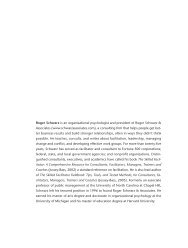The Skilled Facilitator Approach - Roger Schwarz
The Skilled Facilitator Approach - Roger Schwarz
The Skilled Facilitator Approach - Roger Schwarz
Create successful ePaper yourself
Turn your PDF publications into a flip-book with our unique Google optimized e-Paper software.
26<br />
to collaboratively develop a common understanding of a situation and to make<br />
decisions and take actions to which it is fully committed.<br />
As a facilitator, you need not only a set of methods and techniques but also an<br />
understanding of how and why they work. By using an explicit set of core values and<br />
the principles that follow from them, you can improvise and design new methods<br />
and techniques consistent with the core values. Without this understanding, you are<br />
like a novice baker who must either follow the recipe as given or make changes<br />
without knowing what will happen.<br />
Making the core values explicit also helps you work with groups. You can discuss<br />
your approach with potential clients, so that they can make more informed<br />
choices about whether they want to use you as their facilitator. When clients know<br />
the core values underlying your approach, they can help you improve your practice,<br />
identifying when they believe you are acting inconsistently with the values you<br />
espoused. In this way, the core values provide a basis for a collaborative relationship<br />
in which facilitators learn with clients rather than the client’s simply learning<br />
from the facilitator. Because the core values for facilitation are also the core values<br />
for effective group behavior, when you act consistently with the core values, not<br />
only do you act effectively as a facilitator, but you also model effective behavior for<br />
the group you are working with.<br />
Ground Rules for Effective Groups<br />
As you watch a group in action, you may intuitively know whether the members’<br />
conversation is productive even if you cannot identify exactly how they either contribute<br />
to or hinder the group’s process. Yet a facilitator needs to understand the<br />
specific kinds of behaviors that improve a group’s process. <strong>The</strong> <strong>Skilled</strong> <strong>Facilitator</strong><br />
approach describes these behaviors in a set of ground rules for effective groups.<br />
<strong>The</strong> ground rules (see Exhibit 2.2) make specific the abstract core values of facilitation<br />
and group effectiveness.<br />
<strong>The</strong> ground rules serve several functions. First, they serve as a diagnostic tool.<br />
By understanding the ground rules, you can quickly identify dysfunctional group<br />
behavior—which is inconsistent with the ground rules—so that you can intervene<br />
on it. Second, the ground rules are a teaching tool for developing effective group<br />
norms. When groups understand the ground rules and commit to using them, the<br />
members set new expectations for how to interact with each other. This enables<br />
the group to share responsibility for improving its process, often a goal of facilitation.<br />
Finally, the ground rules guide your behavior as facilitator.<br />
<strong>The</strong> IAF Handbook of Group Facilitation



